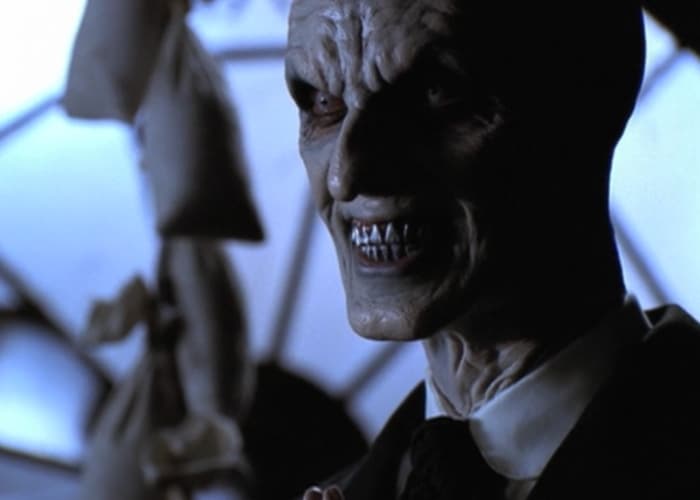
This essay is part of our new series Episodes, a bi-weekly column in which senior contributor Valerie Ettenhofer digs into the singular chapters of television that make the medium great.
Television is a medium that requires your attention. Sure, it’ll never ask you to sit in the dark for two hours and silence your cell phones, and it forgives the occasional multitasking half-watch or drifting-to-sleep rerun. TV, by virtue of its relative accessibility, can’t ask us for too much. But the best TV, the kind you talk about at parties and think about in your quietest moments — that kind of television demands our full attention. Eyes on the screen. Or even better: eyes on the screen, jaw on the floor, hair raised on the back of the neck.
The best episodes of Buffy the Vampire Slayer, of which there are dozens, do all three and then some. Across its seven-season run, the series pulled off considerable emotional risks (“The Body”), narrative risks (“The Gift”), and format-bending risks (“Once More, With Feeling”) to tell a story that was by turns relatable, funny, heartbreaking, and empowering. But no episode asked us to sit up and pay attention quite like “Hush.”
Joss Whedon’s largely silent horror story often feels, in the best way possible, like an exercise in writing with one hand behind one’s back. Around the show’s midway point, and in the midst of a polarizing fourth season, Whedon took away the voices of everyone in Sunnydale, purposely leaving us without the clever quips and well-written monologues on which the series so strongly built its foundation. He and the team behind Buffy bet on a gambit that in retrospect seems impossible to pull off — our attention is infinitely more fractured now than it was in 1999, but even then, a half-hour of prime-time near-silence was likely a hard sell — and gifted us with almost 30 straight minutes of brilliant, bold, genuinely scary visual storytelling sans language.
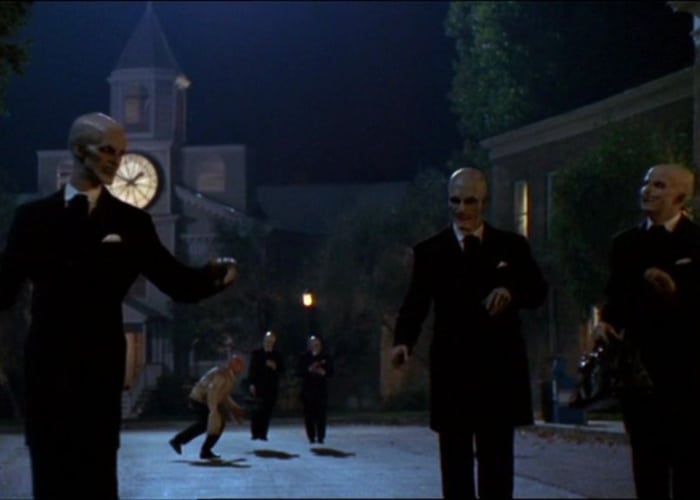
“He’s old, bone white, bald — Nosferatu meets Hellraiser by way of the Joker,” Whedon’s shooting draft episode script from November 5, 1999, says of one of The Gentlemens’ first appearances. With go-to monster actor Doug Jones (The Shape of Water, Pan’s Labyrinth) bringing the freaky, perma-smiling lead Gentleman to life, the group of hovering, suit-wearing fairytale creatures quickly became some of Buffy’s most unique and genuinely frightening villains. The Gentlemen stand out for a number of reasons; they’re poised and charismatic, even in silence, giving each other golf claps and “aw, shucks” gestures as they show off the hearts they’ve cut out of Sunnydale teens. They have frightening henchmen called The Footmen who rush forward in jerky, animalistic motions and wear outfits that look like busted-up straight-jackets. They’re like something out of a horror video game, their brutish erraticism a sharp contrast to The Gentlemens’ delicate personas.
The terror of “Hush” feels more imminent and high-stakes than Buffy’s average monster of the week case, in part because it impacts the entire town. When The Gentlemen come, they steal the voices of everyone in Sunnydale, leaving chaotic silence in their wake. At one point in the shooting draft script, Whedon proposes a shot that shows all of Sunnydale, then notes “or possibly much less than all of it, but I can hope.” These nods to the realistic limitations of the show’s budget come up more than once in his script, making it clear that “Hush” was a singularly ambitious outing from the start. We do see a lot of Sunnydale in the final product, and it’s end-of-days chaos. There’s a businessman, briefcase in hand, sitting pitifully in the middle of the street. There’s a preacher speaking on the book of Revelation, and across the street from him is a man selling whiteboards at 10 bucks a pop. “Hush” is a fast-paced episode, but it also manages to world-build swiftly, establishing a version of Sunnydale that’s startlingly broken down and dystopic in just a few scenes.
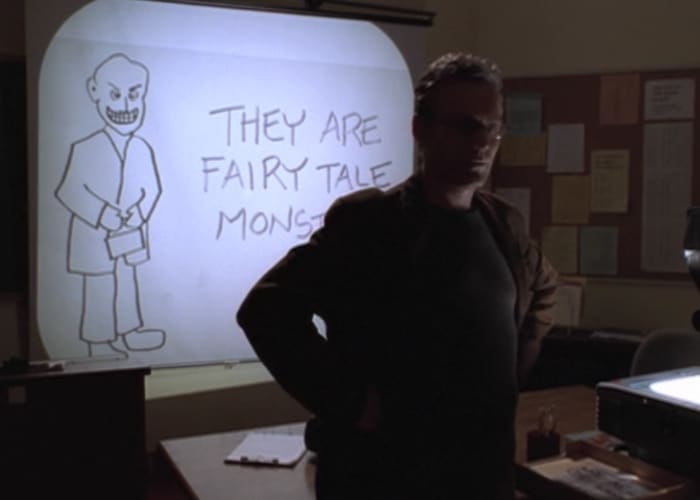
“Hush” may be one of Buffy’s only forays into pure horror, but it also manages to keep its signature comedic streak alive, even as it goes mute. The early scenes of the episode are jam-packed with jokes (“Tonight you have crude oil?” Marc Blucas’ Riley asks skeptically when Sarah Michelle Gellar’s Buffy insists she’s “petroleum” that evening, not “patrolling”), as if making up for any dead space that might exist later on, yet there’s also palpable comedic energy in the silence. Immediately after losing his voice, Xander (Nicholas Brendon) tries to call Buffy, only to realize the futility of the task once they’ve both shrugged into the phone. Giles (Anthony Stewart Head) confidently gives a slideshow presentation on The Gentlemen that’s punctuated by his crudely drawn doodles and Buffy’s own crudely misinterpreted gesture. In silence, acting really is reacting, and each of the core members of the Scooby gang reacts with as much subtlety as they normally would, never going overboard in their wordless performances, delivering perfectly on beats and expressions instead of lines.
“Hush” should be remembered as a narrative highwire act, an acrobatic feat of high concept and precise execution. Yet it also, like the best Buffy one-offs, connects boldly into the overarching plot, incorporating vital information into a non-traditional format in a way that both foiled weekly viewers’ attempt to imagine ahead to pivotal moments, and solidified these major moments in our collective memory by associating them with a novel format. In a later high-concept episode, for example, the beloved musical “Once More, With Feeling,” Giles leaves the group, Willow (Alyson Hannigan) begins lying about magic, Buffy admits a major secret, and she and Spike (James Marsters) share their first real kiss.
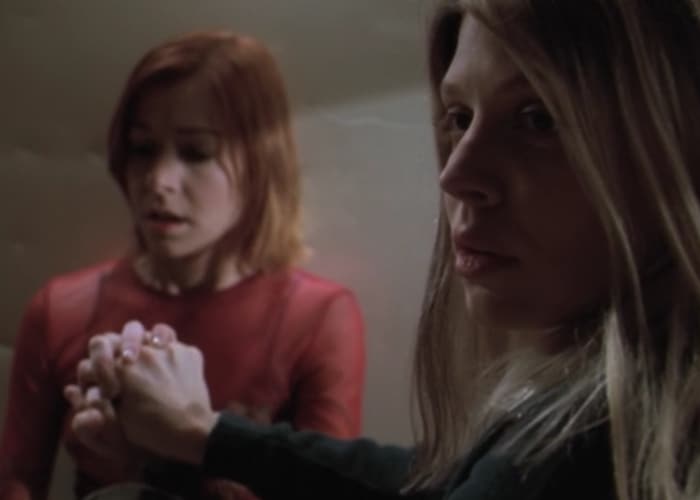
“Hush” is a suitable sister episode, with Riley and Buffy finding out about one another’s professions, Willow meeting and forming an instant connection with Tara (Amber Benson), and foreshadowing both Willow’s eventual power hunger and Buffy’s prophetic dreams. At its best, season four is highly exploratory, highlighting the ways in which group dynamics have changed now that the gang is officially grown up. “Hush” pulls that off too, with the presence of Giles’ friend-with-benefits Olivia (Phina Oruche), Buffy’s inappropriate dream, Anya and Xander’s problems connecting, Willow’s search for a Wicca group, and Spike’s couch-surfing status all indicating the very real growing pains and awkward moments of young adulthood. Each of the chapter’s key themes is communicated gracefully and authentically despite the obstacle of wordlessness. “Hush” was the only episode of Buffy ever to be nominated for a writing Emmy, and it’s a testament to the show’s underdog spirit that the series — which featured great writing throughout and should have been an Emmy contender each year — was only recognized when Whedon made its excellence so specific as to be unignorable.
Tara’s entrance, more than any other moment in the hour, would become a touchstone for fans and still serves as the episode’s greatest narrative accomplishment. The moment the two women’s’ hands intertwine — fingers laced, breathless from the magic coursing through them — holds all the sensuality and intimacy of a love scene, without so much as a kiss. Shifting facets of queer identity are sadly often deemed too complicated for TV, even in 2020, so Buffy had its work cut out for it when it came to explaining how Willow, previously only interested in men, would fall for a woman. Yet in this first magical encounter, as the two pair up to fight off The Gentlemen, we immediately understand that their connection goes beyond friendship. Their curiosity, chemistry, and partnership are conveyed by the actors’ eyes, by camerawork from episode DP Michael Gershman (Whedon also directed), and by music from composer Christophe Beck, whose superb score forms the true narrative backbone of the episode. As Willow would later sum up, “Hello, gay now!”
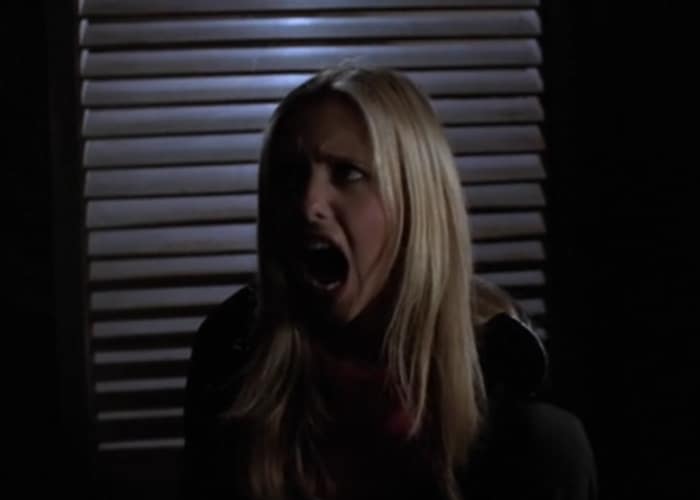
When we think of “Hush” more than 20 years later, indelible images come to mind. There are Tara and Willow’s interlaced fingers or the frozen grin of The Gentlemen gliding by an open window. There’s Buffy’s inappropriate staking gesture or even Giles’ goofily blocky drawings. But there’s one other, too: the fairytale moment at episode’s end, as Buffy, from the floor of a shadowy clock-tower, breathes in her voice and breaks the spell of The Gentlemen with a clear, piercing scream. It’s a moment that punctuates the long-held silence and brings to end an impressively maintained streak of tension. She does it without hesitation, bravely, but also with real fear and desperation. Only the princess can save the town in the fairytale, so of course Buffy can save Sunnydale: she’s our Chosen One. At that moment, we realize that our attention has been magically arrested this whole time, our own voices stolen by an episode of television that asked for our attentive silence. The spell is broken, and as the end credits roll, we too can finally speak again.
Related Topics: buffy summers, buffy the vampire slayer, Episodes, hush, Joss Whedon, The Gentlemen

